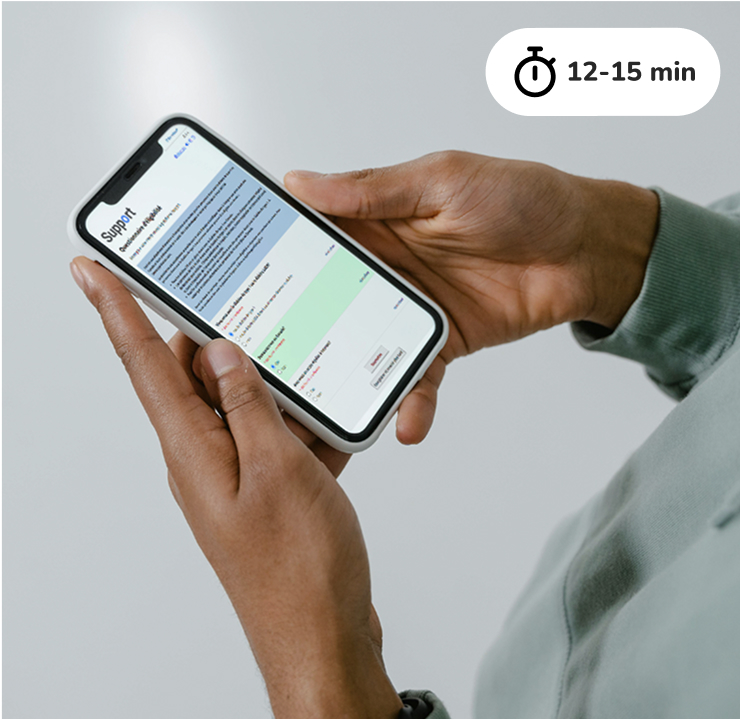Originally published in December 2020, updated in December 2025.
Winter is here, bringing with it the cold weather and additional challenges for managing diabetes. Have you noticed how the outside temperature can influence your blood sugar levels? Extreme temperatures can indeed make it harder to manage your blood glucose. Generally, blood sugar levels are lower in the summer and higher during colder weather.
Why does winter complicate blood sugar management?
Studies have shown that hemoglobin A1c levels and time in target glucose range for individuals living with type 1 diabetes tend to be slightly higher in winter than in summer. Several factors contribute to this variation:
- Reduced physical activity: During the winter, the tendency to be more sedentary can increase insulin resistance, leading to higher blood sugar levels if insulin doses are not adjusted accordingly. Maintaining regular physical activity, even in winter, can help manage your blood glucose more effectively.
- Viral infections: Cold and flu season, common during winter, is known to raise blood sugar levels. If you are sick, closely monitor your blood glucose and consider measuring ketones as well.
- Circulation: Cold weather can slow blood circulation slightly, making insulin distribution in the body less effective.
Other factors influencing blood sugar management in winter:
- Hormonal changes: Hormonal fluctuations related to reduced daylight and cold temperatures can also impact blood sugar management. An increase in cortisol (the stress hormone) in response to cold weather may increase insulin resistance, leading to higher blood glucose levels.
- Eating habits: During winter, eating habits often change, with an increased intake of calories- and carbohydrate-rich foods, especially during the holiday season. This can make managing blood sugar more complex, particularly if insulin doses are not adjusted accordingly.
- Vitamin D: During winter, vitamin D levels can decrease due to reduced sun exposure. Studies suggest that insufficient vitamin D may affect blood sugar management and increase the risk of diabetes-related complications.
- Sleep: The reduction in daylight hours can disrupt the circadian rhythm and affect sleep quality. Poor sleep can negatively impact blood sugar management by increasing insulin resistance and disrupting hormones that regulate blood sugar.
Tips for staying safe during the winter months:
- Stay active: Go for walks, try skiing, ice skating, or even fat biking to stay active. Physical activity helps regulate blood sugar, even in winter.
- Protect your devices and insulin from the cold: If you plan to spend time outside, it is essential to keep your insulin and devices protected from freezing. Insulin loses its effectiveness if it freezes or is exposed to temperatures near freezing point. Additionally, insulin pumps and continuous glucose monitors may be sensitive to cold temperatures, potentially causing malfunctions. Store your insulin in a protected area, such as under your clothing or in an insulated case, and ensure your devices are also kept warm to ensure their proper function.
Winter can be a challenging time for managing diabetes, but by checking your blood sugar more often, little adjustments can be made to fully enjoy the cold season.
Discover how to store your insulin and devices by logging in to Support.
References:
- Ni, W., et al. (2025). Associations of Long-Term Exposure to Temperature Variability with Glucose Metabolism: Results from KORA F4 and FF4. Environmental Science & Technology.
- Surviving winter with type 1 diabetes. (n.d.). Retrieved November 16, 2020, from https://www.jdrf.ca/blog/surviving-winter-with-type-1-diabetes/
- Tsujimoto, T. et al. (2014). Seasonal variations of severe hypoglycemia in patients with type 1 diabetes mellitus, type 2 diabetes mellitus, and non-diabetes mellitus: clinical analysis of 578 hypoglycemia cases. Medicine.
- Higgins, T., et al. (2009). Seasonal Variation in Hemoglobin A1c: Is It the Same in Both Hemispheres? Journal of Diabetes Science and Technology
- Abugoukh, Tahani M et al. (2022). “Does Vitamin D Have a Role in Diabetes?” Cureus





